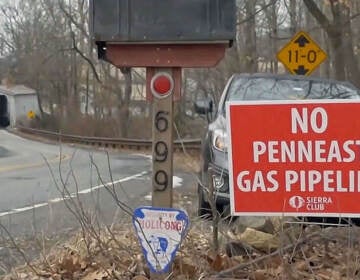PennEast now faces tough scrutiny from DEP after winning court battle
Federal judge grants eminent domain in New Jersey, but pipeline company must still meet many environmental standards.

(Image from PennEast Pipeline Company
This story originally appeared on NJ Spotlight.
—
Now comes the hard part for PennEast.
While the pipeline company won a long-awaited federal court ruling on Friday, allowing it access to private and public lands in New Jersey, it must next meet a long list of permit requirements from other agencies, notably the Department of Environmental Protection, which is expected to provide the sternest test yet over whether the pipeline can be built.
To build its proposed 120-mile natural gas pipeline through New Jersey, the company must satisfy the DEP that it will not violate federal water-quality standards, and that it complies with many other state rules including those on flood hazards, storm water and endangered species.
In the hope of meeting those standards, PennEast must conduct surveys for environmentally sensitive features such as streams and wetlands on the properties of 136 landowners who have previously refused access but are now required by the ruling to allow PennEast officials on their land for surveying purposes.
U.S. District Judge Brian Martinotti granted PennEast the right of eminent domain over the properties some eight months after hearing oral arguments over whether it has the right to take properties from landowners, including the state, which have rebuffed its offers of compensation.
Martinotti rejected the landowners’ arguments that a federal certificate approving the $1 billion pipeline was not final, and that the company could not “condemn,” or take possession of, portions of the properties immediately.
Pipeline company entitled to proceed
“This Court finds PennEast is entitled to the condemnation orders … and they are entitled to them on an immediate and expedited basis,” he wrote in a 50-page opinion.
The judge also rejected arguments by the New Jersey Attorney General’s office that the federal Natural Gas Act is silent on whether a private company can take land by eminent domain. In fact, he wrote, the law allows any party that has a certificate of public convenience from the Federal Energy Regulatory Commission — which issued one to PennEast in January — to acquire rights of way by exercising eminent domain in federal court.
The New Jersey Attorney General’s office, which earlier this year asked FERC to suspend its approval for PennEast, said it was reviewing Martinotti’s ruling, and would have no comment.
If built, the pipeline will carry natural gas from Luzerne County, Pennsylvania to Mercer County, New Jersey. The company says the project will give New Jersey customers better access to low-cost gas from the abundant reserves of the Marcellus Shale. Opponents say the company’s claims of strong demand for the gas are undermined by the fact that states are adopting strong energy goals that do not include fossil fuels like natural gas.
PennEast welcomed the ruling and said its next steps will be to conduct “routine land, environmental and other ground-level surveys” to meet state and federal permit requirements.
A promise to reduce environmental impact
Tony Cox, chairman of the PennEast Board of Managers, said in a statement that the company aims to reduce environmental impact such as tree cutting by running about half of the pipeline along existing rights of way, primarily those already occupied by overhead power lines.
Cox also said the company will allocate “millions of new dollars” for open-space preservation to comply with state law requiring mitigation of preserved lands where the company wants to build the pipeline. In February, the state rejected PennEast’s offers of compensation for several parcels of protected land in Hunterdon County where the pipeline would run.
Private landowners will be compensated for permanent and temporary impacts to their properties, and will retain ownership and use of the lands, including for farming, but will not be allowed to build structures or plant trees directly over the right of way, Cox said.
“We strive to build positive relationships with landowners, the community and agencies and will continue working toward that goal,” said Cox. “With today’s ruling, PennEast can collect and supply scientific data as required by the Federal Energy Regulatory Commission (FERC) and the NJDEP for PennEast’s permits to ensure a thorough and complete application.”
In February, the DEP formally denied PennEast’s latest application for a permit to cross freshwater wetlands, saying the company’s application did not contain all the necessary information.
Will DEP stand in its way?
Martinotti’s ruling is the second recent boost for the pipeline project which has faced strong opposition in many communities, and been assailed as an environmentally damaging and unnecessary project by critics including the New Jersey Rate Counsel, an advocate for utility ratepayers.
In early December, a federal judge in Pennsylvania granted the company its first eminent domain rights in that state, over the property of one landowner who had denied survey access. Other Pennsylvania landowners have granted survey access but continue to fight the condemnation of their lands.
Meanwhile, PennEast’s critics say the company will have its work cut out to convince the DEP that it can build the pipeline without violating the federal Clean Water Act, which the state is responsible for implementing.
“I still think it’s going to be difficult for them to get the permits from New Jersey because they are going through so many environmentally sensitive areas,” said Tim Duggan, an attorney who represents about 40 landowners as well as several nonprofits and local government entities. “It’s going to be hard for them to show that there’s no adverse impact on our water quality.”
Duggan predicted that it will take about a year and a half for PennEast to do its surveys and submit a new application for a water-quality permit, and then for the DEP to evaluate the application. If so, the process would prevent the company beginning pipeline construction in 2019, as it has stated it will.
Company expects to start construction in 2019
PennEast spokeswoman Pat Kornick said Sunday that the company “still anticipates beginning construction in 2019.”
Critics say that preliminary work like tree cutting could still take place in 2019, raising the prospect that some of the rights of way will be cleared before the project gets its final permits from all agencies including FERC.
That would invite comparisons with the proposed Constitution Pipeline which cut trees on a northeastern Pennsylvania farm in 2016 but was then denied a water-quality permit by New York State in a decision that has since been upheld by an appeals court and by FERC. It is now unclear whether that pipeline will ever be built.
In New Jersey, Martinotti’s ruling was not a major surprise but still came as a shock to some landowners.
T.C. Buchanan, who grows fruit, vegetables, hay and Christmas trees on 32 acres in Delaware Township, Hunterdon County, said she had been in tears since hearing from a reporter that opponents had lost the latest battle in their long-running war against PennEast.
If the pipeline is built on the property which her husband’s family has owned since the 1960s, Buchanan said it would mean removing Christmas trees as well as those growing apples and Asian pears, and it would run through her two largest hay fields.
Landowner: ‘I find it very hard to believe…’
“I find it very hard to believe that anybody with a true sense of right and wrong would just allow a corporation that is totally about profit to take and destroy people’s lands that they have bought with their blood, sweat and tears, that they have worked their entire lives for. It blows me away,” said Buchanan, who has lived on the farm for 23 years.
But she expressed confidence that opponents will eventually win the fight, especially if the DEP denies water permits to PennEast.
“I believe we have a state government that cares about the environment, and the people and the drinking water,” she said.
While Martinotti’s ruling is a setback for PennEast’s opponents, the length of time it took to be issued signals that the judiciary is taking seriously its responsibility to consider environmental rights after other branches of government have “abdicated” their responsibilities in that area, argued Maya van Rossum, leader of the environmental group Delaware Riverkeeper Network.
“The judicial branch is an increasingly key player in holding government accountable, so while the outcome was expected, the process behind it sent a powerful message that the judge recognized he had a unique role and duty,” she wrote in an email.
The project also needs permits from the Delaware River Basin Commission, which has yet to begin its review of the PennEast application, and from some federal agencies. DRBC spokespeople did not respond to a request for comment late Friday.
WHYY is your source for fact-based, in-depth journalism and information. As a nonprofit organization, we rely on financial support from readers like you. Please give today.




